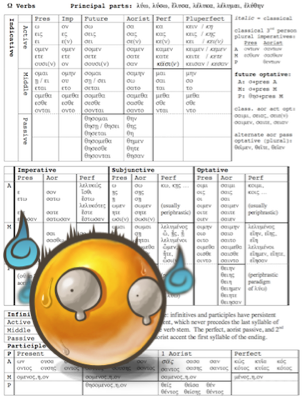Okay so I’m going to go in a weird direction today. I just left comments over at Derek Huether’s and Ty Kiisel’s blogs, about the need for consistency and repetition in project environments. While writing my comments, I remembered back to university when I studied the Attic Greek language.
Okay, it may seem weird that I would bother studying Attic Greek, but I dig languages, and as a child I had this weird “Rain Man-esque” thing going where I did things like memorize the Greek alphabet and the periodic table (I also ate paste, just to keep things in perspective). So it fit. Also, it was fun.
Anyway, one of the things in Attic Greek verb conjugation is, nothing is normal. It’s not like English where you have pretty rigid rules that most verbs adhere to, and there are occasional exceptions. It’s more like, every verb is pretty much riddled with exceptions, and none of the exceptions are consistent from one verb to the next…but if you averaged out all the different forms, there would be one conjugation pattern that would be “the guideline” for all verbs to follow (and then you have to memorize everything else). In all of Attic Greek, there are maybe six verbs that fit this guideline perfectly, and every other verb has some kind of deviation–they may deviate only a little, or they may deviate a lot.

Normal Greek Verb Endings. Check it out, dude. It's complicated. Every individual verb needs to take each one of these forms. And this table doesn't include any exceptions!
You may ask, well if everything’s so different and all-over-the-place, what’s the point of having that guideline at all? Good question! A guideline gives you a place to go. The thing about Attic Greek is, there’s a lot of memorizing. It’s too much, actually, in the limited amount of time you have to learn in a semester. Having a guideline means, if you totally don’t know but have to guess, you stand a much better chance of being accurate.
Projects need guidelines too. They need a structure that is boring, and mundane, and not particularly interesting–but consistent. This is because so much of what happens on a project is anything but mundane. There are surprises all over the place–and you won’t necessarily know what “the right answer” is going to be to deal with them. Having your boring old method to fall back on means you have a place to go. Frameworks don’t guarantee you “the right answer”, but they do give you a much better chance of formulating a good response.
The benefits aren’t just for you, either. Your stakeholders need consistency in reporting so they know exactly what to expect, and can move straight to making decisions. Your team members need consistency so they know what steps to take in the event of a crisis. Overall, frameworks foster trust, loyalty and understanding, because they give people a place to feel secure.
Effective use of frameworks may even result in your team members cheering, χαῖρε, αὐτοκράτορ· οἱ ἀπολούμενοί σε ἀσπαζόμεθα (Hail, emperor: we, who are about to perish, salute you!)
Okay, so maybe that’s reaching a little bit.
